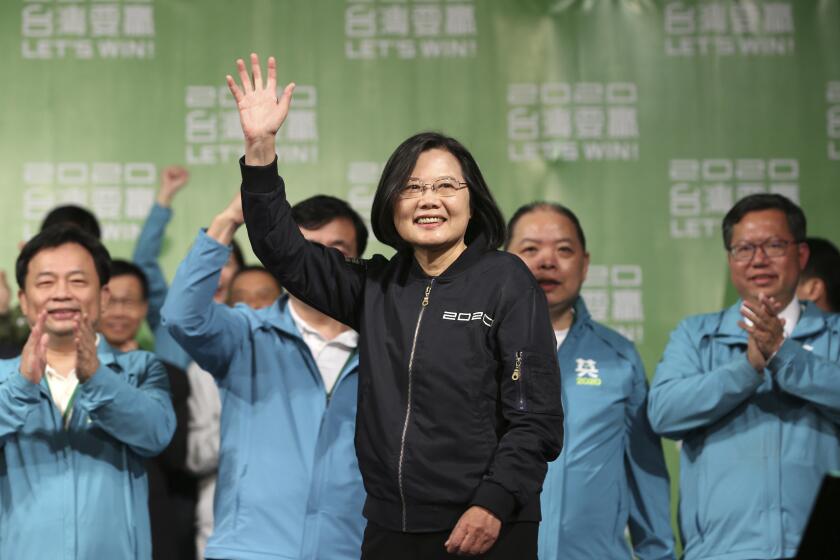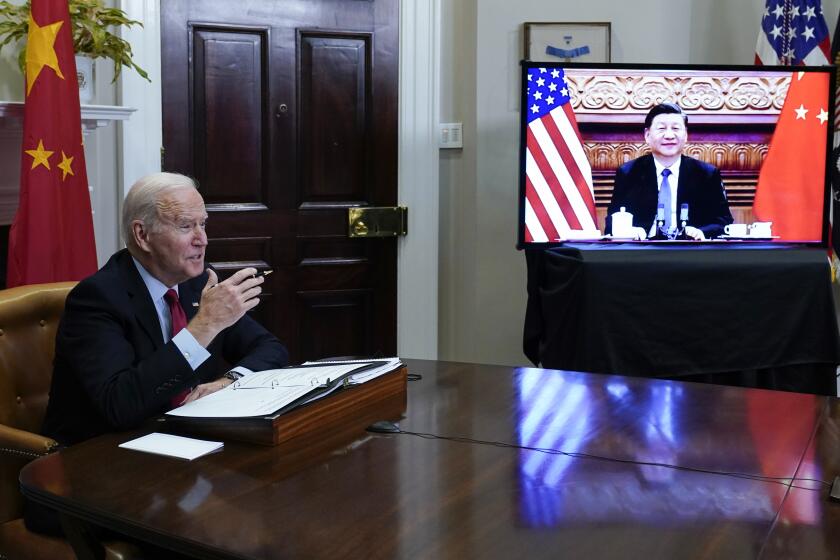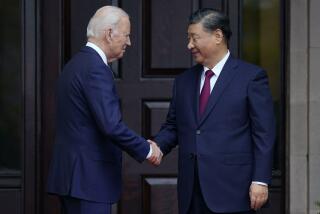In struggle between autocracy and democracy, Biden chooses Taiwan for his team
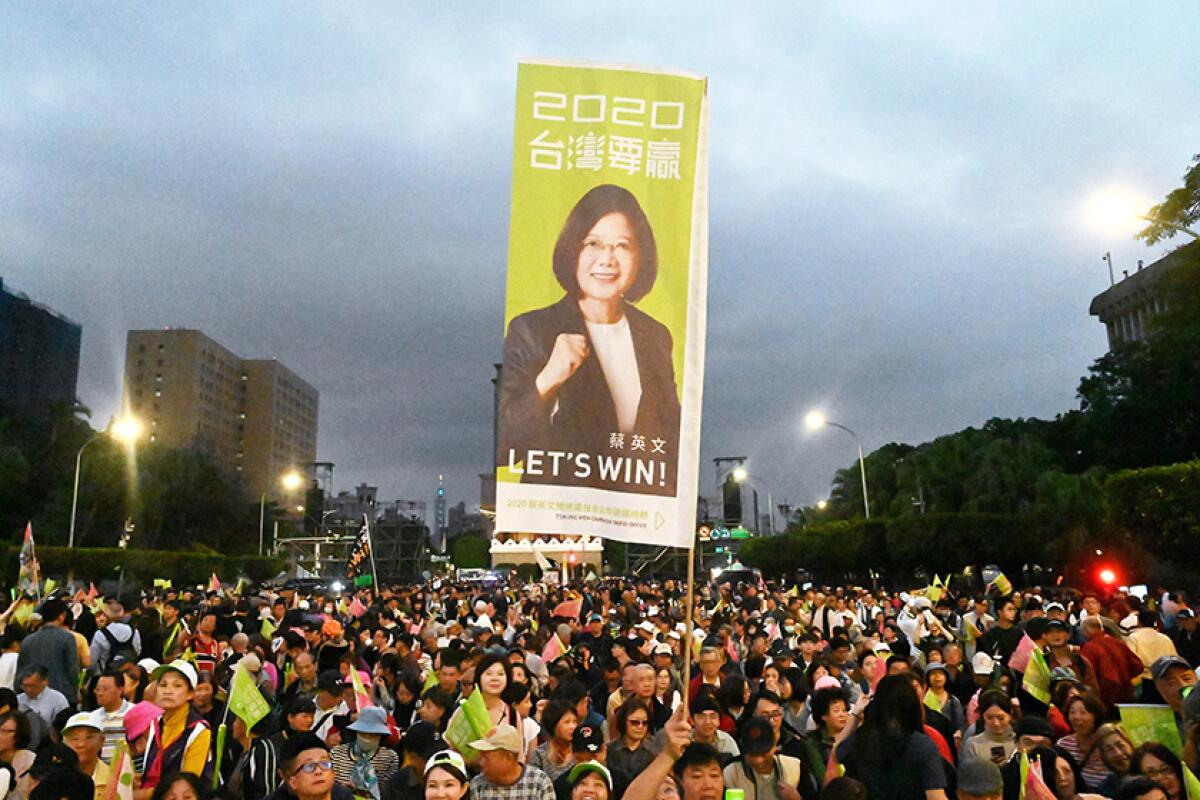
WASHINGTON — Among all the participants in President Biden’s virtual summit on democracy this week, Taiwan holds a unique distinction: It’s the only one that the United States considers to be democratic but not a country of its own.
The island falls into a gray area of American foreign policy because China regards Taiwan as a breakaway province and has vowed to reclaim it, while Taiwan functions autonomously even though it hasn’t formally declared independence. Over the years, Washington’s approach to Taiwan has been guided by arcane and sometimes contradictory policies designed to support the island without provoking Beijing.
Now Biden, by inviting Taiwan to his summit on Thursday and Friday, has taken a careful step toward drawing Taiwan deeper into what he’s described as the global struggle between autocratic regimes and freely elected governments — and by extension, between China and the U.S.
Taiwan brings a potent story to the virtual conference, having peacefully evolved into a robust democracy while China cracks down on dissent and President Xi Jinping consolidates power.
A senior administration official, who spoke on the condition of anonymity to discuss the president’s goals, said the island “can make meaningful commitments towards the summit’s objectives of countering authoritarianism, fighting against corruption, and advancing respect for human rights at home and abroad.”
Not surprisingly, China reacted angrily to Taiwan’s inclusion. Zhao Lijian, a Foreign Ministry spokesman, said the U.S. is using democracy as “a cover and a tool for it to advance its geopolitical objectives, oppress other countries, divide the world and serve its own interests.” A government council even released a document over the weekend making the dubious argument that it’s a democracy as well, albeit one that “avoids the weakness of Western-style political party systems.”
Taiwan President Tsai Ing-wen easily won reelection against a more China-friendly opponent, setting the stage for four more years of chilly relations.
Fang-Yu Chen, a political science professor at Soochow University in Taiwan, said it was difficult to take Beijing’s protests seriously because it appears impossible to satisfy them.
“China will become more and more provocative no matter what we do,” he said. “We should not consider when China will become more angry, because China will become more angry anyway.”
Bonnie Glaser, director of the Asia program at the German Marshall Fund of the United States, a nonpartisan think tank, said there was “no doubt” that Taiwan was going to be invited. However, she said, some details of its participation had been planned to avoid upsetting China more than necessary.
For example, Taiwan’s digital minister and its representative to the U.S. are joining the summit, but its president is not. China’s reaction “is calibrated based on what the United States does,” Glaser said. “And I think the U.S. has carefully managed this.”
Looming over the dispute on Taiwan’s status is the threat of war. Although China professes a desire for “peaceful reunification,” it’s also become more aggressive toward the island, building up its military forces and conducting assault drills near the Taiwan Strait.
The Taiwanese public’s concern about a potential invasion is growing as well. The percentage of people on the island who said they believe China would use military force rose from 16% in November 2019 to 28% in October 2021, according to polling conducted by the Taiwanese Public Opinion Foundation.
It’s unclear what the U.S. would do in the case of an invasion, and it maintains a stance known as “strategic ambiguity.” White House Press Secretary Jen Psaki recently described Washington’s commitment to Taiwan as “rock solid,” but that doesn’t necessarily mean the U.S. military would rush to help. When Biden said in October that “we have a commitment” to defend Taiwan, the administration swiftly clarified that the president wasn’t announcing a change in policy.
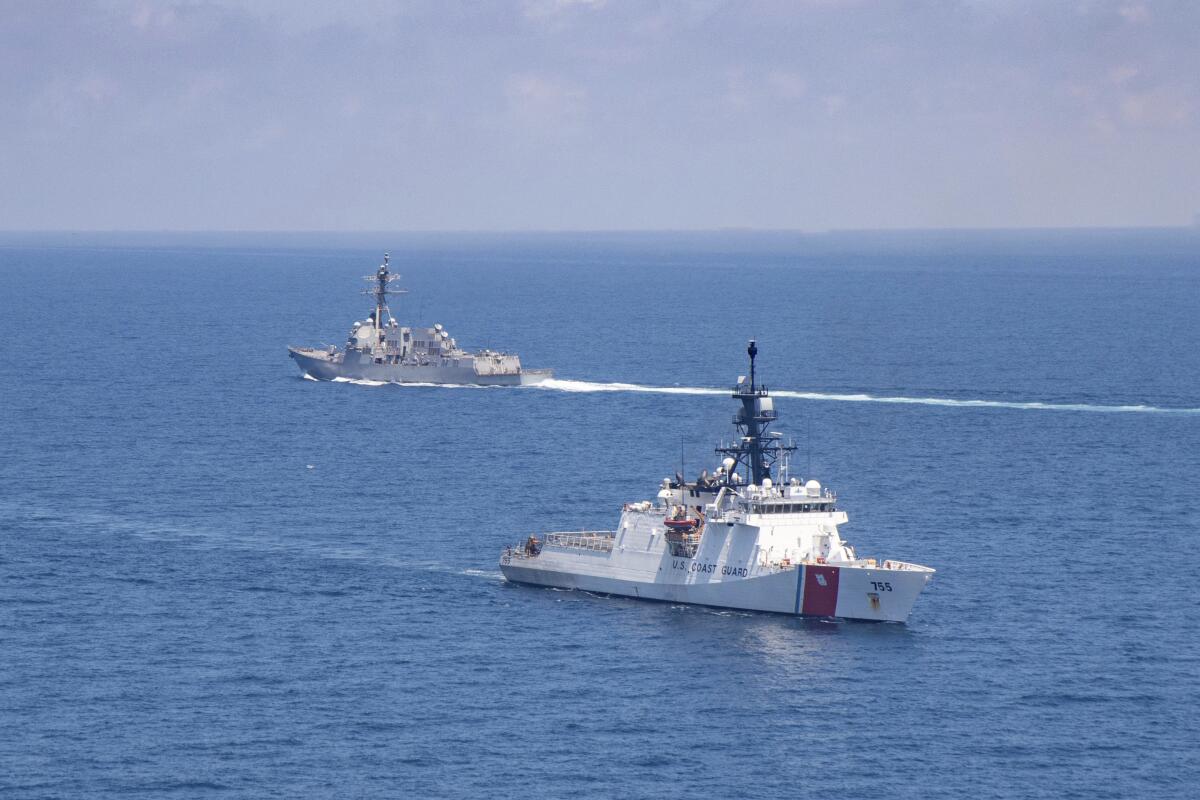
Ryan Hass, a senior fellow at the Brookings Institution who previously worked on President Obama’s National Security Council, said direct communication between Washington and Beijing has “atrophied over the years.”
“As a consequence, both sides have had to rely more on military signaling and public messaging to register their concerns about the other side’s actions,” he said. “The more visible one side’s objections become, the harder it is for the other side to deescalate, lest they appear to be caving to the other side’s demands.”
Hass said that dynamic raises the dangerous possibility of an “escalation spiral” leading to conflict over the island.
Taiwan’s current status dates back to the aftermath of World War II, when communist forces under Mao Zedong took control of China and forced Chiang Kai-shek and his nationalist regime to flee the mainland to Taiwan.
A stalemate developed as the communists promised to retake control of the island and the nationalists declared themselves the rightful leaders of China.
It wasn’t until 1979 that the U.S. formally recognized the government in Beijing and, in a controversial move, severed ties with the administration in Taiwan. Concerned that President Carter had left the island vulnerable, Congress responded by passing the Taiwan Relations Act, which formalized American support for the island and authorized arms sales to help it defend itself.
Today, the U.S. does not have an embassy on Taiwan, but U.S. troops are there training Taiwanese forces.
During a briefing for reporters about Biden’s democracy summit, a question about Taiwan’s participation led to an extended pause, then a discussion of which administration official would answer.
One of them, speaking on the condition of anonymity, eventually said that Taiwan “will be engaged in the summit in a manner consistent with the U.S.’ ‘one-China’ policy, which is guided by the Taiwan Relations Act, the three joint communiqués, and the six assurances,” a rote phrase that sounded like an incantation to ward off international drama.
Julian Ku, a Hofstra University professor who specializes in China and international law, said it’s the kind of “legal gobblygook” that’s typical of statements involving the island’s status.
“Over the years, it’s generated all these weird phrases that are used to signal to China where the U.S. is on Taiwan,” he said. “The Chinese will read every last comma.”
Biden and Xi spoke about Taiwan during a video conference that lasted for more than three hours last month, and the two governments provided somewhat divergent descriptions of the conversation.
The White House said the U.S. “strongly opposes unilateral efforts to change the status quo or undermine peace and stability across the Taiwan Strait,” a statement intended to show opposition to any aggression.
As the two leaders began their videoconference on Monday, there were only a few flickers of warmth from their years of visiting each other’s homelands.
Meanwhile, Chinese state media emphasized that Biden did not support independence for Taiwan, and it reported that Xi blamed tensions on Taiwanese authorities who were “playing with fire.”
“We have patience and are willing with the greatest sincerity and effort to fight for a future of peaceful unification,” Xi reportedly said. “But if the ‘Taiwan independence’ separatist forces provoke, force and even break through the red line, we will have to take decisive measures.”
A reminder of how carefully comments about Taiwan are scrutinized came the following day. After making a speech in New Hampshire, Biden was asked by reporters whether he had made any progress on the island’s status.
He responded definitively.
“It’s independent,” he said. “It makes its own decisions.”
Less than two hours later, the president shifted his phrasing.
“We are not encouraging independence,” he said.
More to Read
Get the L.A. Times Politics newsletter
Deeply reported insights into legislation, politics and policy from Sacramento, Washington and beyond. In your inbox three times per week.
You may occasionally receive promotional content from the Los Angeles Times.
